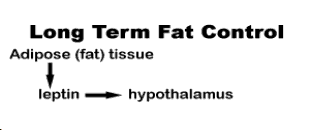
 |
Fat Control: Short and Long Term Planning |
|
Scientists have found a new protein, dubbed glucagon-like
protein-1 (GLP-1), adding to corrent understanding of how fat is
controlled within the human body. Fat control is now believed to consist
of both short-term and long-term regulation. The GLP-1 protein controls
fat on a meal-wise, while a hormone called leptin controls it
continuously over a longer period of time.
The GLP-1 has been found to be made in the hypothalamus, the body's control center located in the brain. When a person eats, the GLP-1 protein tells the stomach, intestines, and pancreas to slow down the digestion and increase the absorption of the food. In the laboratory, rats injected with GLP-1 showed signs that they were full, even though they had not yet finished their normal intake of food. The GLP-1 made the rats seem full, and signalled their brains to stop eating. But, when an inhibitor of GLP-1 was injected into the rats, the rats seemed to eat more than usual. As a result, the rats grew fatter. Whereas the GLP-1 provides the short-term control of fat, leptin,hormone discovered last year, serves as the long-term controller of fat. Leptin is a hormone that is secreted by all adipose (fat) tissues. It serves as the range-setter for "normal" percentage body-fat in each person: if there is much leptin in the blood, the hypothalamus tells the body that it is too fat, and that it must consume less. Thus, would injecting leptin into an obese person reduce his/her appetite enough to decrease their percentage body-fat? The surprising answer is that people who are obese have even more leptin than normal individuals. Having a large supply of leptin is not the only factor in weight reduction. There also need to be the receptors available to respond to the leptin. When these leptin receptors are not available, a person will become fatter, even though his leptin level is high. Scientists think that obese people may in fact suffer from defective leptin receptors. Scientists are still trying to find out more about the various hormones that regulate the amount of fat in the body. They hope to find new hormones or other ways to control the hormones so that people will control their intake of food and be able to live healthier, longer lives.
| |
 
|

|
 
|

|

|
International Food and Information Council Publications by the Biological Psychology Research Group |
 |
| Moment Home Page |
Current Article Index |
Search |
Back Issues |